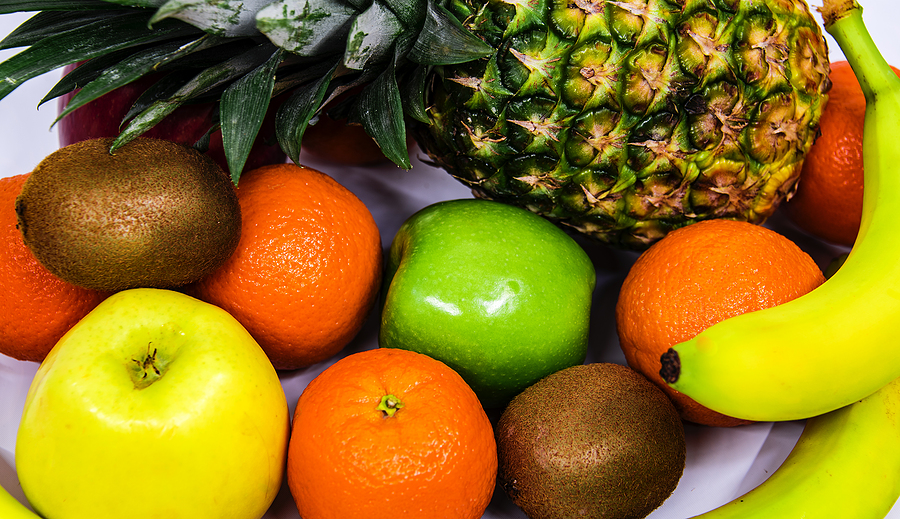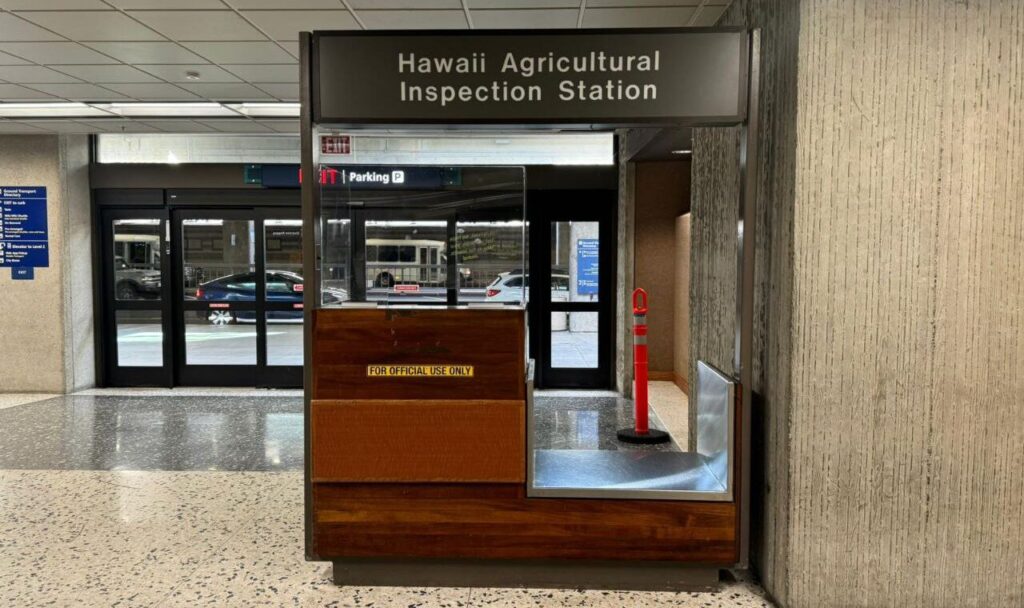AGRICULTURE INSPECTION on Kona airport
Agricuture Inspection at
Kona International Airport
(Kona Airport - KOA)

Hawaii Department of Agriculture Checkpoint at Kona Airport (KOA)
As one of the primary points of entry for visitors and residents arriving on the island of Kona, Kona Airport (KOA) plays a vital role in helping the Hawaii Department of Agriculture (HDOA) protect the state's fragile ecosystem. To prevent the introduction of invasive species, harmful pests, and foreign diseases, the HDOA operates biosecurity and inspection checkpoints at KOA, safeguarding Hawaii's unique biodiversity and agriculture-based economy.
Hawaii's geographic isolation has allowed it to develop one of the most unique and delicate ecosystems on Earth. However, this same isolation makes it extremely vulnerable to non-native species and pathogens. The HDOA checkpoint at Kona Airport serves as a frontline defense against potential biosecurity threats by screening items such as plants, fruits, vegetables, seeds, and live animals arriving on Kona.
The checkpoint is part of a comprehensive effort to ensure that both domestic and inter-island travelers are not inadvertently introducing biological materials that could pose a threat to local crops, native habitats, or animal and human health.
Purpose of the Agriculture Checkpoint
Hawaii is known for its unique biodiversity, largely due to its geographical isolation. This isolation, however, also makes Hawaii's ecosystems vulnerable to external threats, such as invasive species, diseases, and pests, that can impact crops, natural habitats, and even human health. The Agriculture Checkpoint at Kona Airport is specifically designed to screen and manage agricultural imports, pets, plants, and other goods brought into the state to minimize these threats. With Hawaii being a rabies-free state, HDOA's checkpoint is vital in ensuring that animals meet entry requirements to protect the local ecosystem and public health.
Animal Quarantine Procedures at Kona Airport

For travelers with pets or service animals, the agricultural checkpoint at Kona Airport serves as the initial step in Hawaii’s animal quarantine process.
Travelers arriving in Kona with pets or service animals must comply with Hawaii’s strict animal entry requirements. Although the primary Animal Quarantine Station is located on Oʻahu, inspections also occur at Kona Airport as part of the initial review process, particularly for travelers utilizing Kona as a direct port of entry.
The quarantine options include:
20-Day Quarantine: For pets that do not meet vaccination or documentation requirements.
5-Day-or-Less Quarantine: For pets that have mostly completed the requirements but need brief monitoring.
Direct Airport Release (DAR): Pets that meet all health and documentation standards may be released at Kona Airportwithout quarantine.
DAR Requirements Include:
* Microchip identification
* Two valid rabies vaccinations
* Passing a rabies antibody test (FAVN)
* Timely submission of documents to the HDOA
If documentation is incomplete or the pet does not meet health entry standards, animals may be held and transferred to an approved quarantine facility.
Plant and Agricultural Inspections at KOA
All baggage—checked and carry-on—departing from Kona to the U.S. mainland must pass through a Hawaii Department of Agriculture inspection station. This includes screening for fresh fruits, vegetables, flowers, soil, seeds, and live plants.
Commonly Prohibited or Restricted Items:
Raw fruits and vegetables (unless certified or treated)
Soil and potted plants
Untreated seeds or plant cuttings
Uninspected food products or flowers
Inspection agents are trained to identify high-risk items and will confiscate or deny transport for goods that do not meet state or federal standards. Items that have been cleared through certified treatment programs may be allowed after verification.
How to Declare Agricultural Items
Passengers must complete the Hawaii Agricultural Declaration Form, which is distributed on all incoming flights. This form requires passengers to list:
* Any agricultural goods (including snacks, fresh produce, or plant-based souvenirs)
* The origin and type of these items
Upon arrival, travelers proceed to the USDA/HDOA inspection station before checking in bags or entering the terminal. Items will be inspected, approved for transport, or confiscated if deemed unsafe or restricted.
Special Permits and Exemptions
Certain items—such as scientific samples, rare plant species, or research materials—may qualify for entry through a special permit issued by the HDOA’s Plant Quarantine Branch. These permits must be obtained prior to travel and presented at the inspection point upon arrival.
To apply for a permit or confirm if your items require one, travelers should visit the official HDOA website or contact their office directly before flying.
Inter-Island Agricultural Screening at Kona Airport

Hawaiʻi Agricultural Inspection Station – Essential checkpoint at Kona Airport to enforce agricultural regulations for inter-island travel.
If you're flying inter-island from Kona to another Hawaiian destination, it's important to be aware that agricultural inspections apply even within the state. The unique ecosystems across the Hawaiian Islands are vulnerable to invasive species, and certain plants, plant cuttings, fruits, vegetables, seeds, flowers, and animal products may not be permitted to travel between islands without screening.
At Kona Airport, inter-island screening stations are operated by the Hawaiʻi Department of Agriculture (HDOA) near the departure areas to inspect items that could pose ecological risks. Travelers are expected to declare all agricultural goods, even if traveling domestically within Hawaiʻi. Inspection staff ensure these items are screened properly before being cleared for departure.
Handling Confiscated or Non-Compliant Items
If an item is found to be prohibited or improperly documented, passengers may need to:
* Voluntarily surrender the item
* Pay shipping fees to return the item to the mainland
* Allow the item to be destroyed by HDOA agents if it presents a risk to local agriculture or ecosystems
In the case of live animals or pets, travelers must ensure that proper documentation and health clearance are in place. Animals arriving without the correct paperwork may be escorted to an authorized quarantine facility where they will remain until all entry requirements are satisfied and cleared by state authorities.
Contact Information for the Hawaiʻi Department of Agriculture
For travelers with questions about plant inspections, restricted items, or inter-island pet transport through Kona Airport, contact:
Hawai'i Department of Agriculture – Plant Quarantine Branch
Phone: (808) 326-1077
Website: https://hdoa.hawaii.gov
Mailing Address:
Plant Quarantine Branch – Kailua-Kona Office
73-1061 B Nāpua St., Kailua-Kona, HI 96740
The HDOA checkpoint at Kona Airport plays a vital role in protecting Kona’s fragile ecosystems. With the Kona's rich agricultural lands and unique biodiversity, even small risks can have major environmental consequences. By cooperating with screening procedures and declaring all agricultural goods, travelers help preserve the land, flora, and fauna that make the Kona so special.
Understanding and respecting these safeguards ensures a smoother travel experience while contributing to the long-term protection of Hawai'i's one-of-a-kind environment.